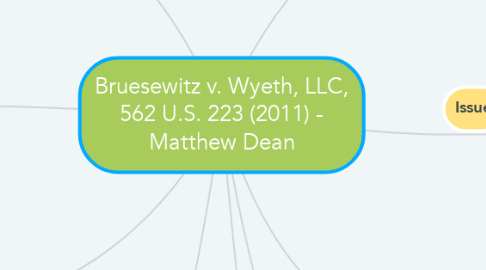
1. Facts
1.1. Parties
1.1.1. Bruesewitz
1.1.2. Wyeth, LLC
1.2. What Happened?
1.2.1. Hannah Bruesewitz was a six month old child when she received a standard vaccine (diphtheria, tetanus and pertussis vaccine)
1.2.2. Soon after receiving the vaccine Hannah started having seizures and since that time has always had seizures, and her parents allege this is a result of receiving the vaccine
1.3. Procedural History
1.3.1. Hannah's parents filed a petition in Federal Claims Court
1.3.2. Federal Claims Court denied their claim
1.3.3. Hannah's parents decided to file a lawsuit in Pennsylvania state court
1.3.3.1. They alleged that the Wyeth product was defective in design and caused Hannah's medical ailments
1.3.4. Wyeth petitioned and won to move the case to Federal District court
1.3.4.1. The 3rd Circuit Court held the previous ruling that NCVIA captured the defective design argument, meaning that Wyeth could not be held accountable for Hannah's medical ailments
1.3.5. The Bruesewitz family appealed to the U.S. Supreme Court
2. Issue
2.1. Are vaccine manufacturers immune to lawsuits regarding product liability due to the National Childhood Vaccine Injury Act (NCVIA) of 1986?
3. Rule of Law
3.1. NCVIA was enacted by Congress to protect vaccine manufacturers from being sued for compensatory claims for vaccine injuries
3.1.1. The intent of NCVIA is protect the vaccine manufacturers from compensatory tort while any claims are paid out by the government. This act helps the vaccine market by not scaring off vaccine manufacturers from being sued and staying in the market.
3.1.1.1. Two Options when claims are denied
3.1.1.1.1. Accept the denied claims
3.1.1.1.2. File tort suit for damages
3.1.2. NCVIA creates what is called a no-fault compensation plan
3.1.2.1. This essentially is a cash reserve designed to pay off claims specific to vaccinations, while limiting the liability of the vaccine manufacturers
3.1.2.1.1. One only needed to fit the description of meeting the requirements for
4. Analysis/Application
4.1. Presenting Sides of the Rule
4.1.1. Wyeth argued that any and all claims against its manufactured vaccines should be covered by NCVIA
4.1.2. The Bruesewitzs argued that the vaccine itself was flawed and they should be able to file suit under Pennyslvania state law for product liability
4.2. Court's Reasonings
4.2.1. The Opinion of the Court was delivered by Justice Scalia
4.2.1.1. He pointed to one paragraph as the deciding factor for the case
4.2.1.1.1. The focus was on the word "unavoidable" and the court reasoned that by the very design and manufacturing of the product, that all efforts had been made to make the product safe and anything else was unavoidable by the very nature of the product, not as a defect of the product
4.3. Facts
4.3.1. NCVIA was created to protect vaccine manufacturers from civil suits including those for product defect liability, based on the "unavoidable" statement that indicates all avoidable methods of harm or threats to illness were reasonably removed when manufactured
4.4. Viewing the Law
4.4.1. Without NCVIA there would be no reason for vaccine manufacturers to enter the U.S. vaccine market, for fear of further suits
5. Conclusion
5.1. The lower courts ruling was upheld and The Supreme Court expressed the ruling that product liability in this case does not apply to Wyeth or other vaccine manufacturers due to NCVIA
6. Impact
6.1. Milik v. Secretary of Health and Human Services
6.1.1. Case very similar to Bruesewitz v. Wyeth in that the Milik's child exhibited behavioral symptoms after a vaccination
6.1.1.1. The Milik's claim was denied and the Milik's tried to rule NCVIA unconstitutional without success
6.2. Sykes v United States
6.2.1. Supreme Court case that ruled on whether a man's driving, based on several facts, could be considered "violent driving" and have him be prosecuted under the Armed Career Criminal Act
6.2.1.1. Justice Kagan references Bruesewitz v. Wyeth with reference to how the Indiana state legislature wrote a law, and how there could be a "more perfect" version, but they do not expect it to be perfect, such as with Bruesewitz v. Wyeth and the "unavoidable" language referenced by Justice Scalia
7. Importance
7.1. This decision is important to those in business because it highlights the extremes of cases of prodcut liability laws
7.1.1. It shows that in certain cases your product can be protected or attacked based on your actions as the manufacturer or company distributing the product
